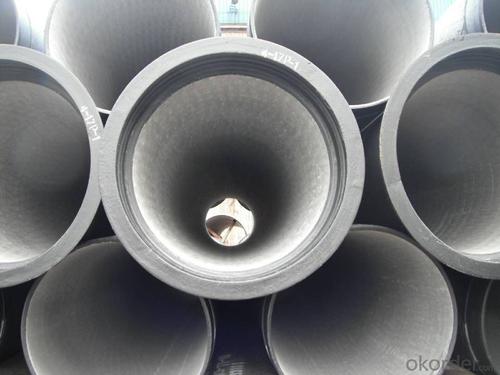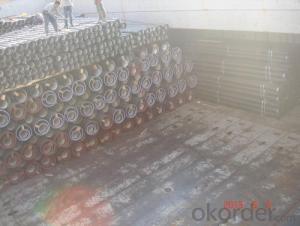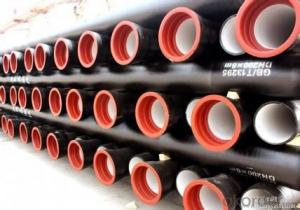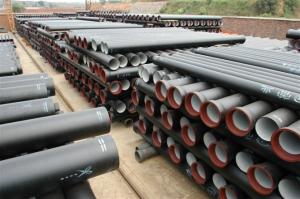DUCTILE IRON PIPE DN150
- Loading Port:
- China Main Port
- Payment Terms:
- TT OR LC
- Min Order Qty:
- -
- Supply Capability:
- -
OKorder Service Pledge
OKorder Financial Service
You Might Also Like
Specification:
1) The standard of pipe: ISO2531:1998, K9
2) Effective length: 6m
3) Inner cement line: Portland cement line as per ISO4179
4) Zinc coating: at least 130g/m2 as per ISO8179
5) Bitumen painting: at least 70um as per ISO8179
6) With 100% quantity of NBR ring, or SBR ring, or EPDM ring as per ISO4633
7) DN80mm-800mm
8) High strength, lighter than grey iron, good corrosion resistance, no furring, small flow resistance, easy fixing, long life tome about 100 yeas
9) Produced by Hangzhou chunfeng machine
10) Checked by automatic inspection equipment
11) Composition:
Chemical composition | |||
Chemical composition | Ductile Cast Iron Pipe (%) | Grey iron pipe (%) | Steel pipe (%) |
C | 3.5-4.0 | 3.2-3.8 | 0.1-0.2 |
Si | 1.9-2.6 | 1.4-2.2 | 0.15-0.4 |
Mn | 0.15-0.45 | 0.4-0.6 | 0.3-0.6 |
P | ≤0.06 | ≤0.3 | 0.02-0.03 |
S | ≤0.02 | ≤0.1 | 0.02-0.03 |
Mg | 0.03-0.06 |
|
|
12) Feature:
Mechanical properties | |||
| Ductile Cast Iron Pipe | Grey Iron Pipe | Steel Pipe |
Tensile Strength(Mpa) | ≥420 | 150-260 | ≥400 |
Yield Strength(Mpa) | ≥300 | No Confirmation | No Confirmation |
Bending Strength(Mpa) | ≥590 | 200-360 | ≥400 |
Elongation (%) | ≥10 | Neglected | ≥18 |
Brinell Hardness(HBS) | ≤230 | ≤230 | About 140 |
13) T type mechanical joint
14) Packing: in bulk or container
- Q: Can ductile iron pipes be used in areas with high soil acidity?
- To ensure the durability and performance of ductile iron pipes in areas with high soil acidity, certain precautions should be taken. Ductile iron pipes are renowned for their strength, durability, and resistance to corrosion, making them suitable for various soil conditions, including those with high acidity. However, the presence of high soil acidity can still pose a potential risk to ductile iron pipes over time. Acidic soils can accelerate the corrosion process, leading to the degradation of the pipe material. To mitigate this risk, the following measures can be implemented: 1. Protective Coatings: Applying protective coatings, such as epoxy or polyethylene, to the outer surface of the pipes adds an extra layer of defense against soil acidity. These coatings act as a barrier, preventing direct contact between the pipe and the corrosive soil. 2. pH Adjustment: Adjusting the pH levels of the soil can help reduce its acidity. This can be achieved by incorporating lime or other neutralizing agents into the soil, creating a more favorable environment for the ductile iron pipes. 3. Cathodic Protection: Employing cathodic protection systems is an effective method to prevent corrosion in ductile iron pipes. This technique involves utilizing sacrificial anodes or impressed current systems to generate a protective electrical current that counteracts the corrosive effects of the soil. 4. Regular Inspections: Conducting periodic inspections is crucial to monitor the condition of the ductile iron pipes in high soil acidity areas. This enables early detection of any corrosion or degradation, facilitating timely repairs or replacements. By implementing these measures, ductile iron pipes can be effectively utilized in areas with high soil acidity, guaranteeing long-term performance and minimizing the risks associated with corrosive soils. However, it is advisable to consult experts or engineers familiar with local soil conditions and project requirements to determine the most suitable materials and protective measures.
- Q: What are the common pressure ratings for ductile iron pipes?
- Common pressure ratings for ductile iron pipes vary depending on the specific application and industry standards. However, the most commonly used pressure ratings for ductile iron pipes are Class 150, Class 200, Class 250, and Class 350. Class 150 ductile iron pipes are typically used for low-pressure applications, with a working pressure of up to 150 psi (pounds per square inch). These pipes are commonly used for water distribution systems, irrigation, and gravity flow sewer systems. Class 200 ductile iron pipes have a higher working pressure of up to 200 psi. These pipes are often used for applications that require a slightly higher pressure, such as industrial water supply, fire protection systems, and wastewater treatment plants. Class 250 ductile iron pipes have a working pressure of up to 250 psi. These pipes are suitable for more demanding applications, such as high-pressure water supply systems, power plants, and municipal water distribution networks. Class 350 ductile iron pipes have the highest working pressure rating, with a maximum pressure of up to 350 psi. These pipes are typically used for heavy-duty applications, such as industrial water supply, oil and gas pipelines, and large-scale water transportation projects. It's important to note that these pressure ratings are general guidelines and may vary depending on the specific manufacturer and product specifications. Consulting industry standards and guidelines, as well as working with qualified engineers and professionals, is essential to ensure the correct pressure rating is selected for a particular ductile iron pipe application.
- Q: Do ductile iron pipes require additional protection against external factors?
- Yes, ductile iron pipes typically require additional protection against external factors such as corrosion and abrasion. This can be achieved through the application of protective coatings or linings, cathodic protection systems, and proper installation practices. These measures help extend the lifespan and ensure the durability of ductile iron pipes in various environments.
- Q: What are the different types of fittings available for ductile iron pipe?
- There are several types of fittings available for ductile iron pipe, including elbow fittings, tee fittings, cross fittings, reducer fittings, flanged fittings, and mechanical joint fittings. These fittings are designed to connect and redirect the flow of the pipe, ensuring a secure and efficient system.
- Q: Are ductile iron pipes recyclable?
- Yes, ductile iron pipes are recyclable. Ductile iron is a type of cast iron that has superior strength and durability, making it an excellent choice for various applications, including water and sewage systems. When these pipes reach the end of their lifespan, they can be recycled and reused. The recycling process involves melting down the ductile iron pipes and using the molten metal to produce new pipes or other iron-based products. Recycling ductile iron pipes not only helps to conserve natural resources but also reduces the amount of waste that goes into landfills. Therefore, ductile iron pipes are considered a sustainable and environmentally friendly option for piping systems.
- Q: DN300 how long is it for water polo and iron pipes?
- Cast iron pipe (Cast Iron Pipe) with the cast iron casting pipe cast iron pipe for water supply and drainage gas pipeline pipe fittings including cast iron casting with fatigue strength by continuous cast iron pipe from the cast iron pipe from the cast iron pipe sand metal two according to material with grey cast iron pipe, ductile iron pipe at the interface with flexible sealing interface LAN interface, self anchored interface, interface of the rigid flexible cast iron pipes rubber ring;
- Q: What are the different types of joints used in ductile iron pipes?
- Ductile iron pipes commonly utilize various types of joints to achieve secure and leak-proof connections between pipe sections. Here are some of the frequently employed joint types: 1. Push-on joint: This joint type offers easy installation without the need for specialized tools. It entails lubricating the gasket on one pipe end and inserting it into the socket of the adjacent pipe. The gasket ensures a tight seal to prevent any leakage. 2. Mechanical joint: Consisting of a gland and a follower gasket, this joint type involves placing the gland over the spigot end of one pipe and inserting the follower gasket into the bell end of the neighboring pipe. Bolts and nuts are then used to tighten the gland, compressing the gasket and creating a secure joint. 3. Restrained joint: In applications requiring restraint against axial movement or pressure thrust, this joint type is utilized. Typically, it involves a mechanical joint combined with additional components like tie rods, thrust blocks, or restrained couplings to provide the necessary restraint. 4. Flanged joint: Large diameter ductile iron pipes often employ flanged joints. They consist of a flange on one pipe end and a mating flange on the other pipe end. The two flanges are bolted together, establishing a robust and secure connection. Flanged joints enable easy disassembly and reassembly when necessary. 5. Welded joint: Welded joints are created by fusing the ends of two pipes together using heat and pressure. This type of joint ensures a permanent and strong connection. Welded joints are commonly employed in underground or buried applications where long-term durability is a crucial factor. It is essential to consider factors such as pipe diameter, application, and project requirements when selecting the appropriate joint type. Consulting with a professional engineer or referring to the manufacturer's guidelines is recommended to ensure the suitable joint type is chosen for ductile iron pipes.
- Q: Can ductile iron pipes be used in underground installations?
- Indeed, underground installations can utilize ductile iron pipes. These pipes are frequently employed in a multitude of subterranean scenarios, such as water distribution systems, sewer systems, and underground fire mains. Their notable attributes encompass robustness, endurance, and resistance to both external strains and corrosion, rendering them fitting for underground installations. Moreover, ductile iron pipes exhibit remarkable adaptability to ground movements and possess the capacity to endure substantial traffic loads. Consequently, they represent a dependable option for underground installations, particularly when stability and longevity emerge as pivotal considerations.
- Q: How do ductile iron pipes perform in freeze-thaw cycles?
- Ductile iron pipes demonstrate exceptional performance in freeze-thaw cycles due to their material properties. With high tensile strength and excellent impact resistance, ductile iron is highly resistant to the stresses caused by freezing and thawing. Unlike other materials, these pipes can withstand the expansion and contraction during temperature changes without cracking or breaking. One of the primary reasons for the success of ductile iron pipes in freeze-thaw conditions is their capacity to absorb and dissipate stresses. The material's high ductility allows for slight deformation under stress, releasing pressure and preventing pipe damage. This characteristic ensures that the pipes can endure repeated freezing and thawing cycles without compromising their structural integrity. Furthermore, ductile iron pipes feature a durable and protective coating, such as cement mortar lining or polyethylene encasement, which further enhances their resistance to freeze-thaw cycles. These coatings offer an extra layer of protection, preventing direct contact between water and the iron and reducing the risk of corrosion. Moreover, ductile iron pipes have an extended service life, often exceeding 100 years, thanks to their inherent strength and resistance to various environmental factors, including freeze-thaw cycles. The pipes' ability to endure these cycles without significant damage ensures the reliability and durability of water distribution systems, even in regions prone to freezing temperatures. In conclusion, ductile iron pipes are highly dependable and excel in freeze-thaw cycles. Their high tensile strength, impact resistance, capacity to absorb stresses, and protective coatings make them the preferred choice for water distribution systems in areas with harsh winter conditions.
- Q: Can ductile iron pipe be used in corrosive environments?
- Yes, ductile iron pipe can be used in corrosive environments. Ductile iron is known for its ability to resist corrosion and has been widely used in various applications where corrosion resistance is required. The corrosion resistance of ductile iron is due to its protective oxide layer, which forms naturally on its surface and acts as a barrier against corrosive elements. Additionally, ductile iron pipes can be coated with various protective coatings such as polyethylene or epoxy to enhance their resistance to corrosion. These coatings provide an extra layer of protection, making ductile iron pipes suitable for use in highly corrosive environments such as wastewater treatment plants, industrial plants, and marine applications. However, it is important to consider the specific corrosive elements present in the environment and consult with experts or follow industry standards to ensure the appropriate coating and maintenance practices are implemented for long-term performance and durability.
Send your message to us
DUCTILE IRON PIPE DN150
- Loading Port:
- China Main Port
- Payment Terms:
- TT OR LC
- Min Order Qty:
- -
- Supply Capability:
- -
OKorder Service Pledge
OKorder Financial Service
Similar products
Hot products
Hot Searches
Related keywords


























